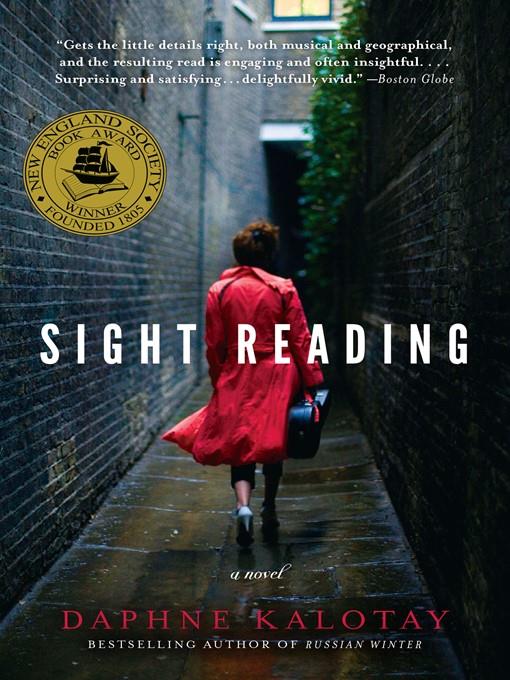
Sight Reading
A Novel
کتاب های مرتبط
- اطلاعات
- نقد و بررسی
- دیدگاه کاربران
نقد و بررسی

April 22, 2013
In her second novel (after Russian Winter), Kalotay returns again to a rarified artistic world where the pursuit of art and beauty clashes with the less noble realities of human interaction. Beautiful Hazel and her talented husband Nicholas Elko are itinerant newlyweds, following his composing career across Europe with their small daughter, when they alight in Boston for a guest conductorship at the conservatory there. But it’s not just another stop on the world tour that’s continually burnished Nicholas’s renown; that the couple’s stay in Boston will change the course of their lives. Remy, a second violin with frizzled hair and untrammeled desires, is drawn in by the conductor’s magnetism. Nicholas doesn’t fight the attraction, and soon leaves Hazel to marry the younger, less beautiful woman. The story follows this triangle from 1987 to 2007 through the insular world of classical music in Boston. Their ties complicate and enrich each character’s life, raising questions about the price of beauty, the power of art, and the shifting nature of identity. While the story eventually loses steam, Kalotay writes elegantly and ably about music and emotion, drafting a moving meditation on the sacrifices made for art and the mysteries of the heart. Agent: Dorian Karchmar, WME Entertainment.

January 1, 2013
Violinist Remy was an ambitious conservatory student when she met hot new composer Nicholas and wife Hazel. Twenty years hence, Remy, now married to Nicholas, encounters Hazel again. Kalotay wrote affectingly of tangled triangles and the artist's calling in Russian Winter, which sold in 24 territories.
Copyright 2013 Library Journal, LLC Used with permission.

May 1, 2013
Kalotay's soulful second novel chronicles the collateral damage three classical musicians inflict on the people who love them. Merging two inherently incompatible modes of expression, writing and music, presents a formidable challenge--one Kalotay rises to admirably here. Even tone-deaf readers will readily grasp the technical aspects of violinist Remy's struggles to attain the first chair that seems forever beyond her reach. Likewise, readers will understand why composer and conductor Nicholas, although he attains a certain level of fame and prosperity (enough to incite the envy of his best friend and colleague Yoni), can never complete his masterwork. Nicholas, Remy and Yoni all teach or study at a prestigious Boston conservatory, and Remy will later play with the Boston Symphony. In their insular world, impulses that defy musical expression are, too often, deployed to wreak havoc in others' lives. Remy's infatuation with Nicholas breaks up his marriage to art historian Hazel, and though Remy will help co-parent Jessie, child of Hazel and Nicholas, her desire for a child of her own will lead to a disastrous interlude with Yoni that will prove life-altering for all three musicians. The book revisits the characters at 10-year intervals and thus becomes a meditation on aging, regret and forgiveness. The plainspoken prose is the ideal accompaniment to these lives, but the characterization of the women is more detailed and grounded. Nicholas' passivity--he is more acted upon than active in shaping his own destiny--and solipsism--the way he can inflict hurt on Remy and Hazel without, seemingly, noticing or caring--is particularly confounding: Why is he the focus of so much yearning? By the time Hazel and Remy realize that Nicholas is an exaltation of style over substance, each is compelled to delude herself that the years they invested in him were not wasted. Unfortunately, just when the motifs of cognitive dissonance and self-deception are about to deliver a fitting climax, the piece resolves with an anodyne coda of unearned redemption.
COPYRIGHT(2013) Kirkus Reviews, ALL RIGHTS RESERVED.

Starred review from April 1, 2013
What might have been simply the story of a man leaving his marriage for a younger woman blossoms into much more. Composer-conductor Nicholas Elko, a rising star in the world of music when he joins the Boston Conservatory, falls in love with student second violinist Remy and leaves his wife, Hazel, and five-year-old daughter, Jessie. Remy feels guilty about breaking up a family, Jessie is angry about what her father did to her mother, and Hazel fears being a lonely divorced woman. Yet as almost two decades pass and these characters struggle with pain and loss, spirits of understanding, reconciliation, and generosity, especially on Hazel's part, emerge and increase. The narrative's chronology, looping back and forth, is set against a vibrant background of music made up of passages of Nicholas' composing and conducting and Remy's playing, with a glossary of musical terms appended. Kalotay (Russian Winter, 2010) celebrates art in general, even considering what it is and isn't, in prose that is brisk and concise as well as sensuous and sumptuous, from Remy's desire to touch Nicholas' skin at his collarbone to Hazel's brilliant use of color and texture in the shop she opens. A fictive musical and familial feast.(Reprinted with permission of Booklist, copyright 2013, American Library Association.)

























دیدگاه کاربران